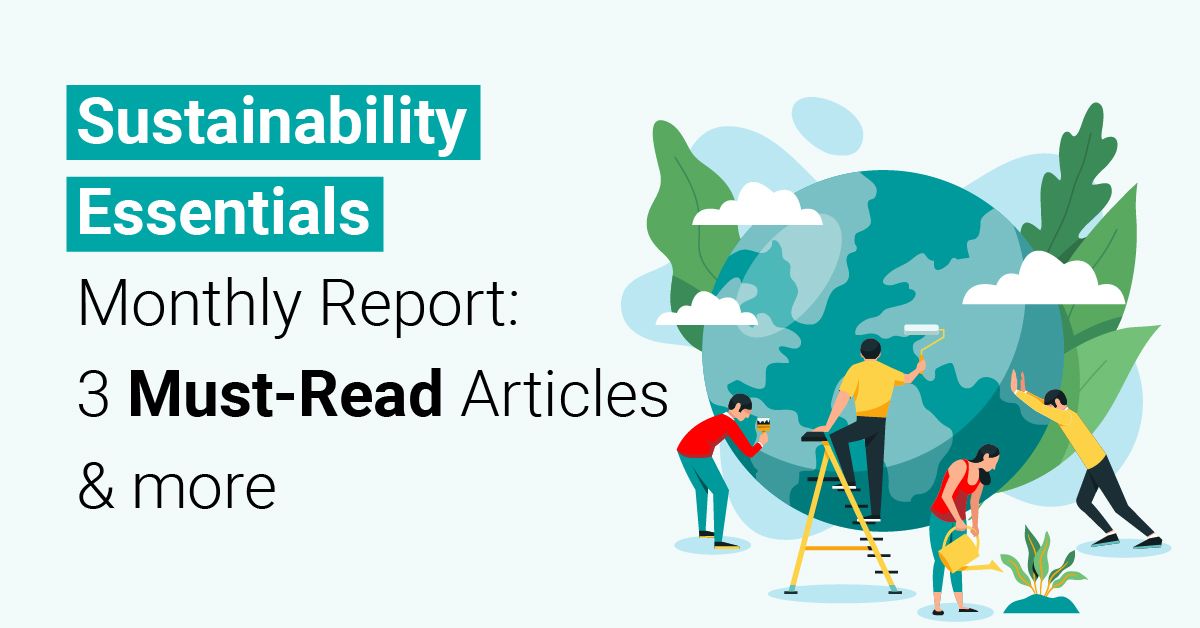
Sustainability Essentials Monthly Report: 3 Must-Read Articles and more
At Essentials, we bring you the top articles and trends curated by the experts themselves. Every month we bring together the most popular articles and trends to provide you with the latest industry updates in one streamlined report. Let’s explore three top picks from the sustainability monthly report for April, from how US public health needs to prepare for the impact of climate change, to China’s burgeoning electric vehicle market to why veganism won’t save the planet.
Climate change affects your health. Fact.
Have you ever thought about the negative physical results a slowly heating world has on humans, in terms of creating potential health hazards? From extreme weather that causes hurricanes, tornadoes, or wildfires to the spread of infectious diseases when a certain virus proliferates due to warmer temperatures, the effects of climate change can be destructive and deadly. Not to mention how drought and water shortages threaten our water and food security.
Who suffers most due to environmental catastrophe?
The short answer is - lower-income groups have been shown to bear the brunt of health issues that are exacerbated by climate change. Public health studies on climate change in the US have the statistics and data to prove it, with poor people of color suffering most. The fact is, though, that all of us are at risk in some way. The good news is there’s light at the end of the tunnel. According to the experts, these climate-induced health hazards can be prevented with the right public health infrastructure and active measures to curb climate change.
President Biden actively working to curb climate change
While everyone is talking about President Joe Biden’s ambitious $2 trillion green infrastructure plan, his 2022 budget has a more integrated focus on aligning public health infrastructure to cope specifically with the impact of climate change. If the president gets congress to approve it, federal and state public health departments will get a big boost in funding to better address the public health impacts of climate change in the next fiscal year. Let’s hope he succeeds and keeps Americans better protected from future pandemics and climatic disasters!
Read the original article here.
Mobility in China: the electric car charges forward
China is making massive and rapid progress with the rollout and infrastructure for electric vehicles. Over the past ten years, it’s grown to be one of the most valuable markets for sustainable transport in various forms. There is still massive scope for growth, thanks to active government support of clean energy and transport.
###When it comes to mobility Is China ‘streets ahead’?
China certainly has ambitious goals to become more environmentally friendly and utilize green and clean energy sources wherever possible. Last year President Xi Jinping announced the country’s 14th Five-Year Plan. Their overall aim is to achieve peak emissions before 2030 and carbon neutrality by 2060. Electric mobility forms a large part of how the government hopes to achieve this.
How to tap China’s demand for electric vehicles
Hui He, the China Regional Director of the California-based International Council on Clean Transportation (ICCT) has some keen insights on Chinese transportation policies and practical roll out. She believes there is a huge market to be tapped for pro-active partners in the alternative mobility industry. Now is the time to act.
Read the original article here.
Veganism not a sustainable solution to climate change issues
Advocates of veganism believe that if humans switch to an exclusively plant-based diet we can save the planet and help reverse climate change. The truth is it’s not that simple. We need to think more holistically about our food choices, as monocultures also negatively affect ecosystems. There’s a need to distinguish between plant- and animal-based foods that form part of the problem and those that are part of the solution.
What is the best way to eat sustainably?
To lower carbon emissions substantially and mitigate the pitfalls of climate change, we do need to change the way we currently eat. No one is arguing that the beef industry, for example, makes an enormous contribution to greenhouse gas emissions.
But a purely plant-based approach presents its own complications. The most practical, healthy, and sustainable answer lies, some argue, with eating what the land is environmentally designed to grow, not necessarily what’s fashionable on a plate.
Building soil fertility and health
If we cultivate and farm what a certain geographical and climatic area is best designed to grow and diversify crops, we build soil health and allow it to regenerate naturally. Grazing animals on land can assist this regenerative process, as they form part of the natural ecosystem. So, there’s no need to stop eating steak, as long it’s sourced from sustainably farmed cows reared by ethical farmers.
The real solution to eating sustainably appears to be to mix it up (not just mixed salad greens), to eat smaller portions, and to keep food sources local!
Read the original article here.
Which article from the April monthly report was your favorite? Let us know in the comments below, we would love to hear from you.
Take a look at more top articles, trends, and experts by signing up to our newsletter—By getting to choose which topics interest you the most, you get the latest news delivered with ease: https://essentials.news/sustainability